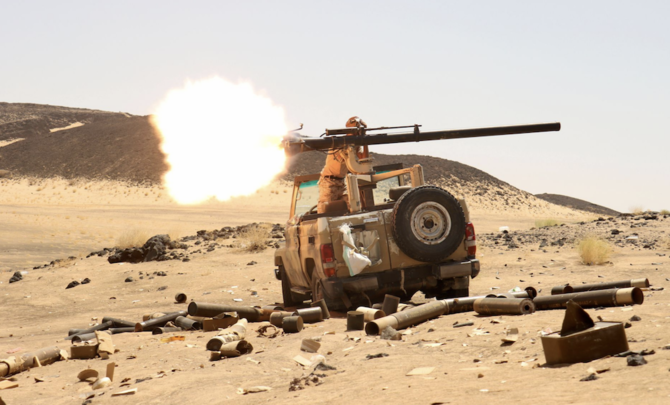AL-MUKALLA: The Iran-backed Houthi military offensive on Yemen’s central city of Marib has tapered off as the rebels have suffered heavy casualties, defections and stiff resistance from Yemen’s army and allied tribesmen, three military sources told Arab News.
Houthis have been mounting a major offensive on the city of Marib since February in a bid to seize control of the government’s last bastion in the northern half of the country, which contains rich oil reserves, gas fields and big electricity stations.
The offensive has claimed the lives of thousands of combatants on both sides and triggered a huge displacement from contested areas in and around Marib.
This week, Yemeni military officials say the intensity of the Houthi offensive has largely eased up for the first time since February as the rebels have dispatched fewer fighters and military equipment to the battlefields.
“The Houthi attacks on Marib have decreased in May compared to April,” Yemeni army spokesperson Maj. Gen. Abdu Abdullah Majili told Arab News on Tuesday.
During the past four months, the Houthis have rejected local and international calls for stopping their deadly assault on Marib amid warnings that their invasion of the strategic city would aggravate the already desperate humanitarian situation in Yemen. The city hosts more than 2 million internally displaced people who have fled fighting or Houthi crackdown in their home cities and villages.
Yemeni officials believe the Houthis in the Marib province have been weakened by heavy casualties, intensive airstrikes, attritions and local tribes’ reluctance to join the fighting.
Col. Yahiya Al-Hatemi, director of Yemen's army’s military media, told Arab News that the growing number of deaths among Houthis in Marib has prompted many Yemenis to reject Houthi calls for fighting government troops.
“The Houthi attacks (in Marib) have decreased. People have refused to join their ranks as a result of the massacres that took place in recent battles in Marib,” Al-Hatemi said.
Arab coalition warplanes have long been credited for foiling Houthi attempts to advance on the ground by targeting rebels’ reinforcements and military locations, Yemeni military officials say.
The government’s news media said the Houthis have officially admitted to the deaths of more than 500 fighters during the holy month of Ramadan, which started on April 13.
Based on Houthi media reports, Al-Masdr Online, a popular Yemeni news site, said the rebels had arranged funeral processions for 522 fighters. That number includes many high-ranking military leaders who were killed in fighting with government troops or by Arab coalition airstrikes in Marib between April 13 and May 12.
A military source with contacts inside Houthi-controlled territories told Arab News the Houthis have moved troops from less intense battlefields to Marib to shore up their depleted forces after fighters abandoned their recruitment campaigns.
“Many people abandoned their weapons and returned to their houses after the Houthis lied about making victory in Marib. Those who are fighting in Marib came from other battlefields,” said the military source, who spoke on condition of anonymity because he was not authorized to brief reporters.
At the same time, the Yemeni government and military officials have warned that the Houthis are trying to cash in on the growing resentment in Yemen toward the Israeli military operations in Gaza. They are using that conflict to recruit new fighters and raise funds for their weakened offensive in Marib.
“We warn citizens in the areas controlled by the Houthi militia against falling victim to the Houthi exploitation and misinformation which uses the Palestinian cause and the tragedy of our steadfast Palestinian people in the occupied territories for making political gains with the aim of prolonging the war in Yemen and continuing to kill Yemenis,” Muammar Al-Eryani, Yemen’s minister of information, wrote on Twitter.
The Yemeni government has once again threatened more military operations if the rebels do not halt their offensive on Marib and continue to reject peace initiatives.
During a meeting with French Ambassador to Yemen Jean-Marie Safa in Riyadh on Monday, the speaker of the Yemeni parliament, Sultan Al-Barkani, warned that the Yemeni government could intensify military options until the Houthis accept UN- and US-brokered peace ideas and cease their attacks on Yemeni civilians.
















